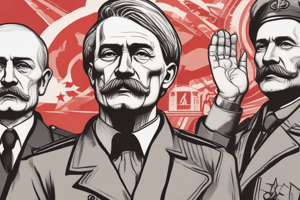Podcast
Questions and Answers
According to Lenin, what was the driving force behind historical change?
According to Lenin, what was the driving force behind historical change?
- Religious beliefs
- Technological advancements
- Class struggle (correct)
- Environmental factors
What concept did Lenin emphasize to prevent dissent within the party?
What concept did Lenin emphasize to prevent dissent within the party?
- Democratic centralism (correct)
- Autocracy
- Dictatorship
- Anarchy
Which stage of capitalism did Lenin consider imperialism to be?
Which stage of capitalism did Lenin consider imperialism to be?
- Final stage (correct)
- Transitional stage
- Stagnant stage
- Initial stage
What did Lenin believe was necessary to solve the issues caused by imperialism?
What did Lenin believe was necessary to solve the issues caused by imperialism?
Which of the following was NOT a key aspect of Lenin's political philosophy?
Which of the following was NOT a key aspect of Lenin's political philosophy?
Why did Lenin believe a vanguard party was necessary?
Why did Lenin believe a vanguard party was necessary?
What was a key characteristic of Lenin's version of socialism?
What was a key characteristic of Lenin's version of socialism?
In Lenin's philosophy, what role did he assign to the vanguard party?
In Lenin's philosophy, what role did he assign to the vanguard party?
What was Lenin's view on the state in relation to the ruling class?
What was Lenin's view on the state in relation to the ruling class?
Why did Lenin believe in a centralized command economy for socialism?
Why did Lenin believe in a centralized command economy for socialism?
Flashcards are hidden until you start studying
Study Notes
Lenin's Political Philosophy: Vanguard Party, Socialism, Democratic Centralism, Class Struggle, Imperialism
Lenin's political philosophy, known as Leninism, is a development of Marxist thought and has significantly shaped the political landscape of the 20th century. Lenin sought to apply Marxist principles to the conditions of the 20th century, primarily in the context of Russia. His philosophy places a great emphasis on the role of the vanguard party, the importance of imperialism, the idea of democratic centralism, the role of the state, and the command economy.
Vanguard Party
Lenin believed that the working class could not achieve revolution on its own and that a vanguard party was necessary to lead the way. This party would be made up of professional revolutionaries who would be more committed to the cause than the working class. Lenin saw the vanguard party as the key to achieving a successful socialist revolution. The vanguard party would act as a catalyst, precipitating events along their inevitable course toward socialism.
Socialism
Lenin's version of socialism was characterized by a centralized command economy, where the state controlled the means of production and distribution of goods. Lenin believed that this was necessary to achieve socialism and protect the working class. He saw the state as an instrument of the ruling class and believed that it needed to be replaced by a proletarian state. Lenin's socialism was based on the idea of workers' self-management and the abolition of private property.
Democratic Centralism
Lenin believed in the concept of democratic centralism, which meant that decisions were made democratically, but once a decision was made, everyone had to follow it. This idea was meant to prevent dissent within the party, as Lenin believed that unity was necessary for success. Democratic centralism was also a means of ensuring that the party remained accountable to its members and the working class.
Class Struggle
Lenin saw the class struggle as the driving force behind historical change. He believed that the working class was destined to overthrow the bourgeoisie and establish a socialist society. Lenin's emphasis on class struggle was instrumental in shaping the revolutionary tactics of the Bolsheviks, leading to the establishment of the Soviet Union.
Imperialism
Lenin believed that imperialism was the highest stage of capitalism and that it led to inequality, poverty, and war. He saw the need for the working class to fight against imperialism and believed that only through socialist revolution could these issues be solved. Lenin's theory of imperialism was based on the rise of corporate monopolization, expansion of finance capital, export of capital taking precedence over the export of commodities, an increased presence of international monopoly associations, and the conclusion of dividing the planet territorially.
In conclusion, Lenin's political philosophy, as embodied in Leninism, has had a profound impact on political movements and ideologies around the world. His ideas on the vanguard party, socialism, democratic centralism, class struggle, and imperialism have been both praised and criticized for their revolutionary nature. Despite the controversies surrounding his philosophy, Lenin's contributions to modern political thought are undeniable and continue to be studied and debated by scholars and activists alike.
Studying That Suits You
Use AI to generate personalized quizzes and flashcards to suit your learning preferences.




